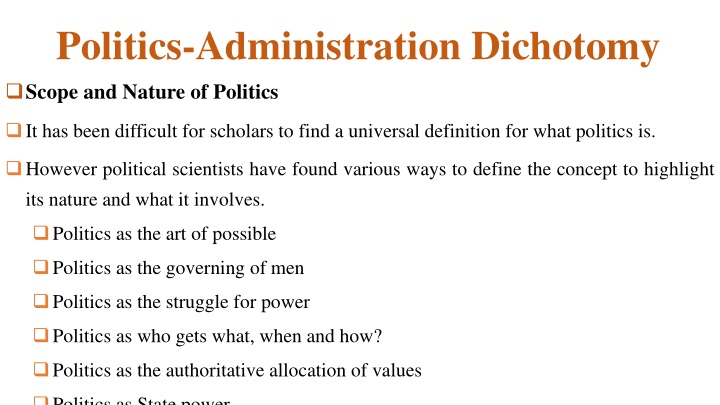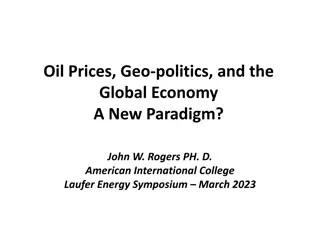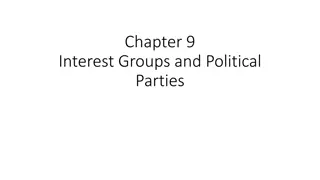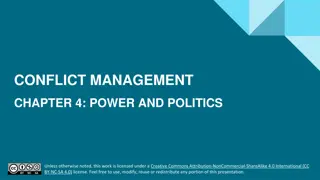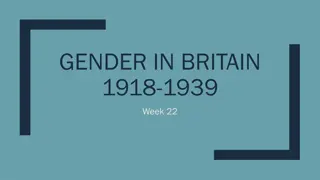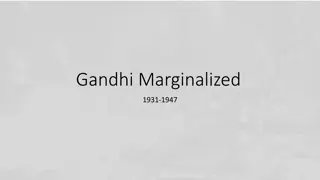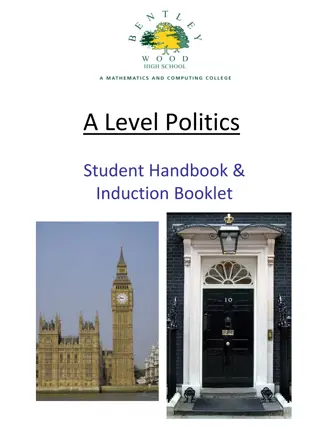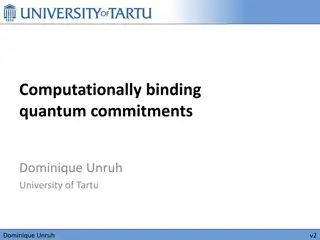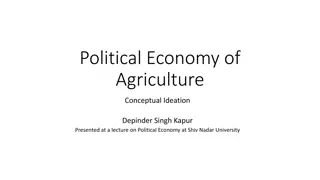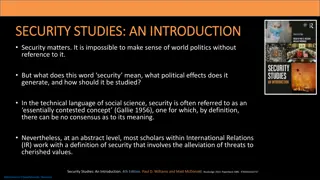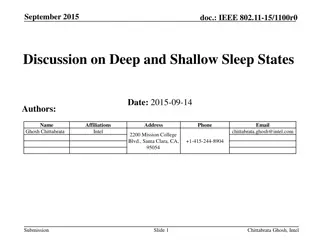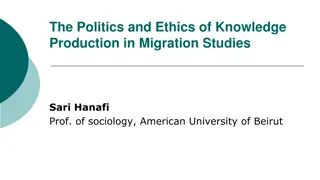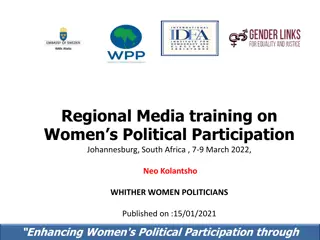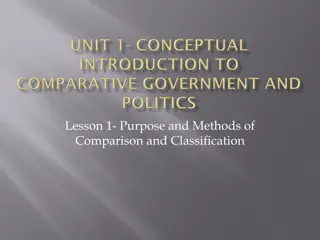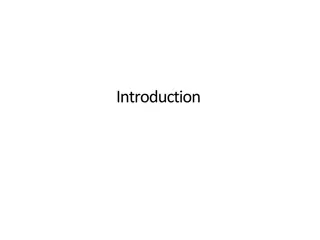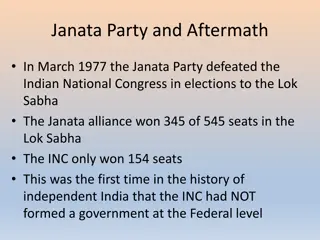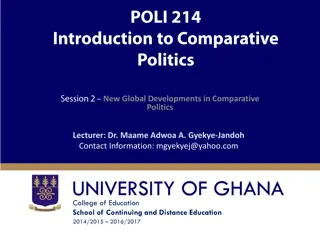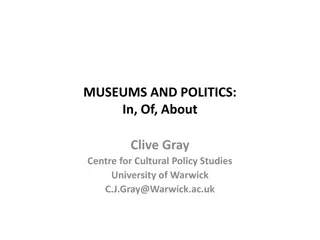Various Definitions of Politics and Their Significance
Scholars have struggled to define politics universally, leading to various definitions highlighting its nature and scope. Definitions range from politics as the art of possible to the struggle for power and the governing of men. Each definition sheds light on different aspects of politics, such as the distribution of resources and the exercise of power. Understanding these definitions helps comprehend the complexity of political systems and relationships.
Download Presentation

Please find below an Image/Link to download the presentation.
The content on the website is provided AS IS for your information and personal use only. It may not be sold, licensed, or shared on other websites without obtaining consent from the author.If you encounter any issues during the download, it is possible that the publisher has removed the file from their server.
You are allowed to download the files provided on this website for personal or commercial use, subject to the condition that they are used lawfully. All files are the property of their respective owners.
The content on the website is provided AS IS for your information and personal use only. It may not be sold, licensed, or shared on other websites without obtaining consent from the author.
E N D
Presentation Transcript
Politics-Administration Dichotomy Scope and Nature of Politics It has been difficult for scholars to find a universal definition for what politics is. However political scientists have found various ways to define the concept to highlight its nature and what it involves. Politics as the art of possible Politics as the governing of men Politics as the struggle for power Politics as who gets what, when and how? Politics as the authoritative allocation of values Politics as State power
Politics as the Art of Possible This definition was first attributed to Otto Von Bismarck of 1867 Politicians must possess some level of skills to enable them perform their responsibilities to the satisfaction of their citizens. The study of powers that shape, maintain and alter the direction of the state. The law of powers govern the world of states as the law of gravity governs the physical world. Improper application of powers is likely to result in failure to satisfy the needs of citizens The definition of politics in terms of the need to have some level of skills and power to be able to succeed is not peculiar to government. some level of power is required in the almost in all spheres for the pursuit of the achievement of goals eg. Homes, churches, the market places schools etc.
Politics as the Governing of Men This definition in focused on the relation between the govern (rule) and the governed (ruled). The complex nature of society contemporary had made it impossible to practice theAthenian system of government. Society involves two categories of people one group assigned the responsibility to rule and the other submits to be ruled While one group rules, the other group must be satisfied to be ruled The definition however did not distinguish between to who are engaged in governing the state and others who govern other sectors like companies, churches, schools etc. It did not explain what is maent by governing or to be governed.
Politics as the Struggle for Power Robert Dahl is associated with this. All political activities involve power. Power is the necessary tool required to exert influence and control Even though politics invariably involves the use of power and influence, it does not necessarily mean that all power and influence relationships could be described as political. The relationship between husband and wife, parents and children, teachers and students etc. involves power but are obvious not political.
Politics as who gets what, when and how Harold Lasswell defines politics as who gets what, when and how Resources are own by the state Politics involves the distribution of resources of a state to its citizens Politicians determine how the resources are distributed, when they are distributed and who what a particular resource is given to But according to critics like Nnoli, there is nothing political about the distribution of resources Whenever two or more people gather, the question of who gets what is likely to come up especially when the gathering is of the same purpose.
Politics as the Authoritative Allocation of Values Politics as theAuthoritativeAllocation of Values (David Easton). Politicians have power, control and influence based on their office The office gives them the mandate to allocate (distribute) values (resources) for the citizens of the state However distribution of values and resources alone can not be enough to paint the true picture of politics
Politics as State Power All leaders exercise certain powers as a result of their position or office The difference between a religious leader and the president is the kind of power they have and can exercise The president has state power It is only politicians(the president, legislature) that have state power Politics however is concern with the possession and exercise of state power Politics can therefore be properly defined as All those activities directly or indirectly associated with the seizure of state power, the consolidation of state power and the use of state power
Administration Administration generally refers to the day-to-day management of activities to achieve a goal. Administration is to care for or to look after people, to manage affairs Therefore administration simply means management of affairs. It involves such functions as planning, organizing, directing, staffing, coordinating, reporting and budgeting (PODSCORB), in organizations.
Politics-administration dichotomy An organization can be referred to as a system of roles graded by authority. Organization is a social unit of people that is structured and managed to meet a need or to pursue a collective goal All organizations need policy makers (administrators) Policy is the political determinant of what government decides to do or not to do Administration is the implementation of the policies decided on by government (politicians) Administration is the channel through which public policy is realized Should policy-making be seen as a separate activity from administration? (politicians) and implementers
Differences between politics and administration: Differences between politics and administration: Politics is about the use of state power or the science of governing whereas administration is the science and art of actualizing what government wants to do. Politicians determine the ends (what ought to be done) whilst administrators devise the means (how to do it) Hierarchically, politicians occupy the realm of authority and are constitutionally responsible for decision making whilst the administrator serves only in an advisory capacity. Politics is about the actions of elected representatives and their electorates whereas administration is about the activities of professionals Administration stresses technical factors but politics stresses values. Politics is an area of change and unpredictability but administration is an area of stability and routine. In dealing with clientele, politics seeks the interests of supporters whilst administration thrives on impartiality of rule and processes Administrators are appointed on the basis of qualification and examination whilst political influence goes into the appointment of politicians. Administrators are protected and restricted by a code of conventions, unlike politicians. Administrators do not go to parliament for their stewardship but politicians do.
The Orthodox view The Orthodox view The big debate is dichotomy and the modified view of politics-administration dichotomy To the orthodox scholars, policy-making and administration should remain two separate activities independent of each other Politicians decide what should be done through public-policy making while bureaucrats carry out the decisions of the politicians The model represents a superior-subordinate relationship Politicians wield more powers than the administrator Politics determine goals while administration ensures that those goals are met Administration is to remain neutral politically therefore they cannot engage in public policy-making between the orthodox view of politics-administration
Cont. Cont. Administrators rely on technical competence execute the decisions of politicians They are protected against political pressures as the ac discretionary based on their technical competence Two main scholars are known to the engineers behind the orthodox school of politics and administration dichotomy. They are Woodrow Wilson and Frank Goodnow Woodrow Wilson in one of his books for instance, wrote The field of administration is a field of business. It is removed from the hurry and strife of politics Administration lies outside the spheres of politics Administrative questions are not political questions Even though politicians wield more powers than administrators, the should be allowed to manipulate administrators This can be done by strictly separating the two activities.
The Modified Politics-Administration Dichotomy It is becoming increasing difficult to draw a line between policy making and administration. It would therefore be folly to say that administrative officers should have absolutely no hand in the formulation of policy(john Pfiffer). The orthodox view prohibits for instance local government officials from policy side of government even though they always do(Montjoy & Watson). In practice administrators can participate in the policy process, exercise as much discretion as will be allowed and still hold a clear line against particularistic requests directed to them or to members of their staff.
CONT. CONT. In general, it is fair to conclude that the modified dichotomy model permits public administrators to provide policy leadership to elected officials But elected officials should leave implementation and general management questions to professional administrators They constructed a version of the dichotomy that endorsed the involvement of administrators in policy making but prohibited council members from interfering in the management of the government. They did this by developing a distinction between politics and administration on the one hand, and between policy and administration on the other.
The Partnership Model of the Dichotomy The Partnership Model of the Dichotomy This model focuses on the interconnectedness between politics (however defined) and administration. It holds that administrators can and often do have great impact on policy making and that elected officials can and often do have great impact on administration. While the modified dichotomy model sanctions administrators venturing into policy making, the partnership model not only sanctions that as well but also sanctions elected officials venturing into administration by being involved in implementing and executing laws and policy.
Cont. Cont. Goodnow, perhaps moving from what he believed should ideally occur, noted that in practice actual political necessity requires that there shall be harmony between the expression and execution of the state will. To him this harmony can be obtained by sacrificing the independence of either politics or administration. Later he indicated that while the function of politics has to do primarily with the expression of the state will, it has to do secondarily with the execution of that will. This indicates that the separation between the two must somehow be bridged, even if the independence of one or the other is sacrificed. e later concluded that the executive function must of necessity be subordinated to the function of politics. Goodnow stopped short of arguing for a full partnership, because he believed that political control of administration must be mediated. For example, the general conduct, but not concrete actions of those who exercise administrative functions should be subject to control.
Complementarity of Politics & Administration Complementarity of Politics & Administration Svara is one of the scholars who emphasize the complementarity of politics and administration. This complementarity stresses interdependency, reciprocal influence, extensive interaction between elected officials and administrators, along with recognition of the need for distinct roles and political supremacy. A basic principle of this model stresses that elected officials and public administrators join together in pursuit of sound governance. Although other parts of Svara's definition also emphasize components of the modified dichotomy model, his complementarity model most heavily emphasizes the partnership between politics and administration. He argues that those who study the relationship of elected and appointed officials in a democracy should examine the impact each has on the other. This notion of complementarity is in line with the systems model, which holds that politics and administration are seen as individual subsystems within the larger political system. Implying both have roles to play in the political system, which are complementary.
